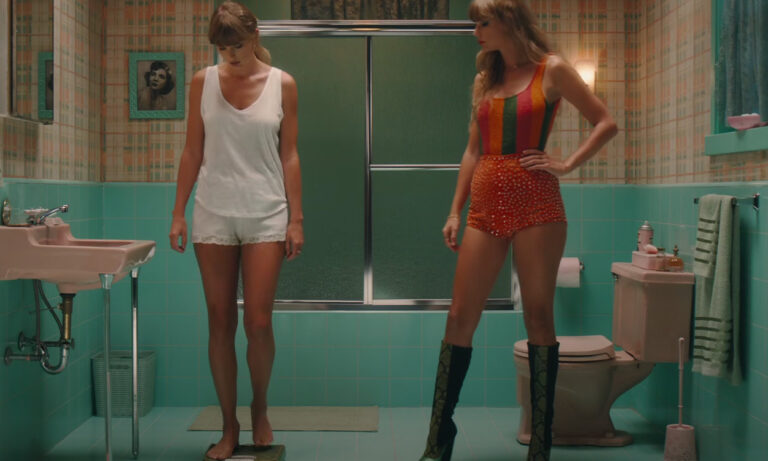Everything you need to know about Taylor Swift’s fatphobia accusations
On 28 August 2022, Taylor Swift attended the Video Music Awards (VMAs) and took home the ‘Video of the Year’ award. Unencumbered by an aggravated and irate Kanye West—who had previously publicly shunned and embarrassed the singer during the 2009 VMAs—Swift gleamed and teased audiences with her spanking new album Midnights.
Fast forward to October, only a week after its highly-anticipated release, fans are taking up their battle stations—conflicted over whether a clip from the ‘Anti-Hero’ music video is fatphobic or not.
The ‘Anti-Hero’ controversy
If you haven’t yet seen the music video, the moment in question depicts Swift standing on a set of weighing scales while a separate—and evidently evil—version of herself looks on. Rather than showing a number, the scales simply read “FAT.”
The internet, as it so seems, is incredibly divided over this clip. Some netizens have found it to be a harmful perpetuation of a negative stereotype, while on the other hand, others have praised the moment as “relatable,” applauding the singer for speaking openly about her struggles with body image.
Twitter—aka the place in which all things pop culture are debated and demolished—was the primary platform where thoughts were shared regarding the video. On both sides of the conversation, eating disorders (EDs) appeared to be the primary point of contention.
A user wrote: “One criticism of Taylor Swift’s music video is that you don’t need to be fatphobic in your description of your body image. It isn’t bad to be fat, and her having the scale say ‘fat’ is a radical simplification of eating disorders, especially when fat people have EDs too.”
Another Twitter user commented: “Taylor Swift stepping on the scale and then her expression dropping when she sees the word ‘fat’ just to further perpetuate the idea that it’s a bad word and bad to be it. Being fat isn’t sad, scary or bad, you’re just deeply fatphobic. Even if unintentional, it’s still so harmful.”
For those in defence of Swift—which there are many—the online dialogue pertains to a similar topic but is instead centred on validating the musician for opening up about her own ED and in turn providing some with comfort.
One fan in support stated: “If you think Taylor Swift is being fatphobic in her music video you’re dismissing and invalidating every human who has an eating disorder aka a very legitimate mental illness.” Another Swifty wrote: “As an actual fat person everyone calling Taylor Swift a fatphobic is completely out of their mind and undermining her ED, her struggles and the public scrutiny she has been suffering for years.”
Whatever your thoughts on the topic—whether pro or against—the Folklore creator evidently took notice and, only a few days later, the original video was removed by Apple Music and replaced with a version that doesn’t feature the word in question.
Discourse surrounding the word ‘fat’
While it is crucial to never invalidate someone’s personal journey either in relation to their body image or an eating disorder, it is also important to consider the harmful impact that can be fostered when we continue to associate the word ‘fat’ with feelings of being lesser than or unworthy.
In 2021, a creative named “Your Fat Friend” took to the internet to discuss their feelings about the current societal discourse surrounding this topic. In their words, “Some people use fat to mean unlovable, undesirable, slovenly, unintelligent, lazy. Others use it to mean wealthy and greedy; other times we use it to mean poor and lazy. Sometimes it’s a stand-in for sloth, gluttony, and other deadly sins. Fat becomes a floating signifier—a word that’s a blank screen for us to project our assumptions and feelings onto.”
They continued, “Know that your discomfort with the word fat may indicate discomfort with fatness or with fat people ourselves. If that’s the case for you, work on uprooting your own anti-fat bias.”
In 2019, Teen Vogue reiterated this sentiment, emphasising how reclaiming this word is a powerful form of self-empowerment and growth. And, even more so, individuals should be aware of how using this term negatively in a digital space can have devastating consequences. Context matters.
Final thoughts
Having watched the video myself, both the unedited and edited versions, I can understand both sides of the argument. While netizens are right in defending Swift’s autonomy to create content reflective of her personal struggles, it’s also valid that some are taking offence.
While integral progress has been made, mainstream media is still heavily prone to idolising and celebrating what society has deemed a ‘desirable’ body: white, thin, and able.
Though we might all be secretly thrilled at the resurgence of chokers, baby tees, and rhinestones, the Y2K resurrection also brought with it many of the toxic fashion trends we should’ve left in the 2000s. Low-rise jeans and denim mini-skirts—while they ought to be enjoyed by everyone—did ultimately pave the way for a torrent of fatphobic abuse.
With this all being said, perhaps the latest Midnights drama may prove as a step in the right direction towards normalising this conversation and allowing everyone’s voices to be heard.






